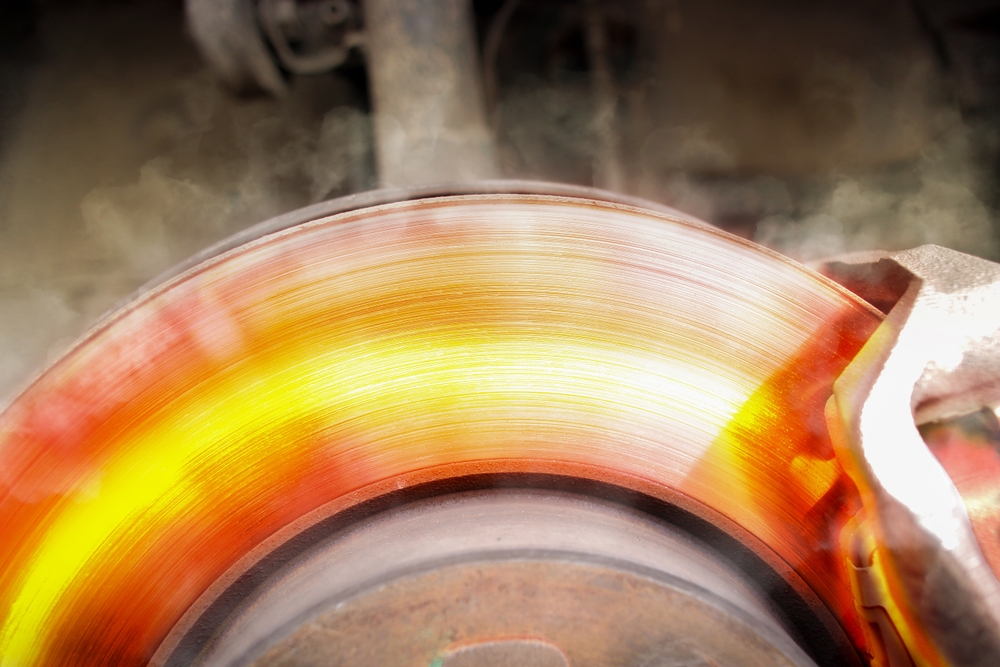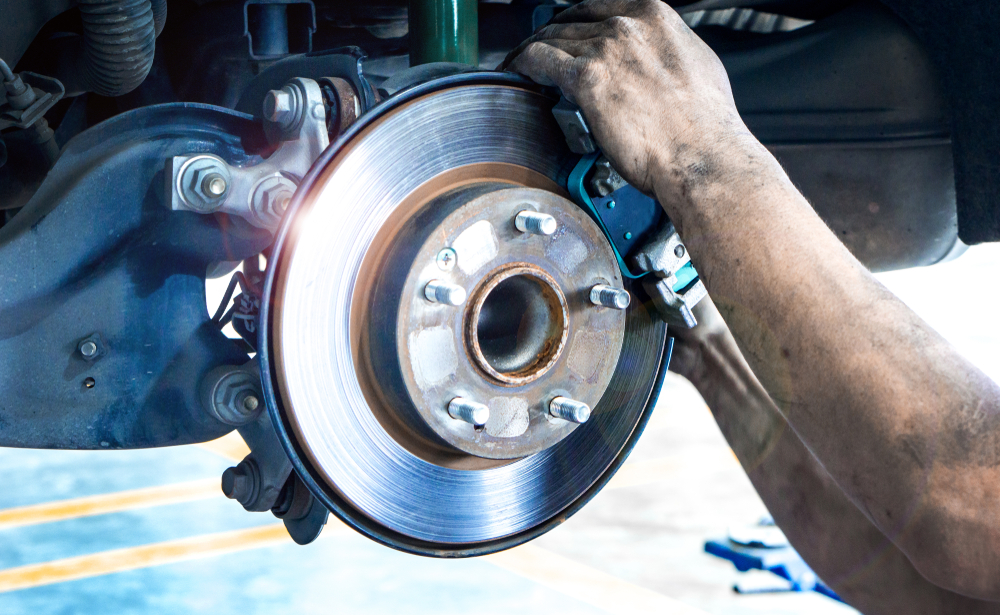When summer arrives in Westminster, so does the call of Colorado’s magnificent mountains. Whether you’re planning weekend getaways to Vail Pass or taking family adventures through the Eisenhower Tunnel, your Mercedes-Benz braking system faces challenges that simply don’t exist in regular city driving. The steep descents along I-70, combined with Colorado’s intense summer heat and high altitude, create conditions that can quickly overwhelm unprepared brake systems. At Mercedes-Benz of Westminster Service Center, our certified technicians understand exactly what your luxury vehicle needs to confidently handle these demanding mountain roads.
Why Mountain Driving Demands a Summer Brake Check
Colorado’s I-70 mountain corridor presents unique challenges that most drivers never encounter in regular commuting. The sustained downhill grades from Loveland Pass and the Eisenhower Tunnel create continuous brake engagement, generating tremendous heat that can quickly overwhelm standard brake systems. Unlike stop-and-go city traffic where brakes get brief cooling periods, mountain descents require steady, controlled braking for miles at a time. This sustained use generates temperatures that can easily exceed 500 degrees Fahrenheit, pushing brake fluid dangerously close to its boiling point and causing brake fade when you need stopping power most.
Westminster’s elevation of 5,384 feet already reduces air density, meaning your brakes work harder to dissipate heat compared to sea-level driving. When you add the additional 5,000+ feet of elevation gain to reach mountain passes, the situation becomes even more challenging. Mercedes-Benz vehicles are engineered for performance, but even the finest German engineering requires proper maintenance to handle Colorado’s extreme conditions. The Colorado Department of Transportation specifically warns drivers about brake system preparation, particularly noting that Colorado’s high elevation and topography can increase the likelihood of brake failure, making preventive service absolutely critical for safe mountain travel.
Signs It’s Time for a Pad, Rotor, or Fluid Service
Your Mercedes-Benz communicates brake system needs through several unmistakable warning signs that become even more critical before mountain adventures. A high-pitched squealing sound when braking typically indicates brake pad wear sensors alerting you to replacement time—ignore this warning, and you risk expensive rotor damage during steep descents. Vibration through the steering wheel or brake pedal often signals warped rotors, a condition that becomes dangerous when navigating winding mountain roads where precise control is essential.
Perhaps most concerning for mountain driving is a soft or spongy brake pedal feel, which often indicates moisture contamination in brake fluid. Brake fluid naturally absorbs moisture over time, lowering its boiling point from the standard 401 degrees Fahrenheit to potentially dangerous levels. When brake fluid boils during intense mountain braking, it creates vapor bubbles that compress under pressure, dramatically reducing braking effectiveness. This condition, known as brake fade, has contributed to numerous accidents on Colorado mountain passes. If you notice any of these symptoms, or if your brake fluid hasn’t been changed in two years, it’s time for professional brake service before attempting any serious mountain driving.
Additional warning signs include grinding sounds during braking, which indicate metal-on-metal contact between worn pads and rotors, and pulling to one side while braking, suggesting uneven brake wear or caliper issues. These problems become magnified under the stress of sustained mountain braking, making early detection and repair essential for both safety and cost management.
OEM vs. Performance Brake Options: What Mercedes Owners Should Know
When choosing brake components for your Mercedes-Benz, understanding the difference between Original Equipment Manufacturer (OEM) and performance options can significantly impact your mountain driving experience. Genuine Mercedes-Benz brake parts are engineered specifically for your vehicle’s exact specifications, ensuring perfect fit and optimal performance under normal driving conditions. These OEM components typically provide excellent longevity and quiet operation, making them ideal for daily Westminster commuting and occasional mountain trips.
However, for drivers who frequently tackle Colorado’s challenging mountain passes, performance brake upgrades offer significant advantages. Cross-drilled and slotted rotors provide superior heat dissipation compared to standard smooth rotors, helping prevent brake fade during long descents. The holes and slots create additional surface area for heat transfer while also helping evacuate hot brake dust and gases that can reduce braking effectiveness. High-performance brake pads, often featuring ceramic or metallic compounds, maintain consistent friction even at elevated temperatures, providing confident stopping power when navigating steep grades.
The trade-offs are worth considering: performance brake components may produce slightly more noise and dust compared to standard OEM parts, and they typically cost more initially. However, for serious mountain drivers, these upgrades can prevent the expensive consequences of brake system failure, including rotor warping, brake fade, and potential accidents. Our service team can help evaluate your specific driving patterns and recommend the optimal brake setup for your needs and budget.
MB Westminster’s Brake Service Process: What We Do & Why It Matters
At Mercedes-Benz of Westminster, our brake service process goes far beyond basic pad replacement to ensure your vehicle is truly ready for Colorado mountain conditions. We start with a comprehensive multi-point brake system inspection that examines not just the obvious components like pads and rotors, but also critical elements often overlooked by general repair shops. Our factory-trained technicians check brake fluid color and contamination levels, inspect brake lines and hoses for damage or deterioration, and test caliper function to ensure even brake application.
Our state-of-the-art diagnostic equipment can measure rotor thickness to precise specifications, determining whether resurfacing is adequate or full replacement is necessary. When replacement is required, we stock genuine Mercedes-Benz parts and high-quality performance alternatives, ensuring you get exactly what your driving style demands. The brake fluid flush process uses specialized equipment to completely purge old fluid and any moisture contamination, replacing it with fresh, high-temperature brake fluid that maintains its properties even under extreme mountain braking conditions.
What truly sets our service apart is our understanding of Colorado-specific brake challenges. We adjust brake pad bedding procedures to account for high-altitude conditions and provide detailed guidance on proper mountain driving techniques. Our certified service technicians don’t just fix immediate problems—they educate customers about maintaining optimal brake performance in Colorado’s unique environment, helping prevent costly emergency repairs during mountain adventures.
Why Now Is the Smartest Time to Book (Heat + Altitude Risks)
Summer presents the perfect storm of conditions that stress brake systems beyond their normal limits. Westminster’s summer temperatures routinely reach the upper 80s to low 90s, and mountain elevations can add another 10-15 degrees to brake operating temperatures. Meanwhile, Colorado’s intense UV radiation at high altitude breaks down brake components faster than at sea level, accelerating rubber deterioration in brake lines and seals. These factors combine to create conditions where brake system failures become more likely just when mountain traffic is heaviest.
The timing of brake service matters more than many drivers realize. Brake components perform best when properly bedded and tested under gradually increasing stress rather than being thrown immediately into extreme mountain conditions. Fresh brake pads need time to properly mate with rotor surfaces, a process that should happen during normal driving rather than during emergency braking on a steep mountain descent. Similarly, brake fluid reaches optimal performance after settling and any air bubbles have been completely purged from the system.
From a practical standpoint, summer brake service scheduling helps you avoid the frustration and expense of emergency repairs during peak vacation season. Mountain towing services are expensive and often require long waits, while emergency brake repairs at mountain locations typically cost significantly more than planned service in Westminster. Additionally, booking brake service now ensures you have access to optimal appointment times and won’t have to delay important travel plans waiting for service availability.
What to Do Before Your High-Altitude Trip
Proper pre-trip preparation can mean the difference between a memorable mountain adventure and a dangerous emergency situation. Beyond ensuring your brake system is in optimal condition, there are several practical steps every Mercedes-Benz owner should take before heading into Colorado’s high country. First, familiarize yourself with proper mountain driving techniques, including downshifting to use engine braking and maintaining steady speeds rather than riding the brakes during descents.
Check your owner’s manual for specific altitude and temperature recommendations, as some Mercedes-Benz models have particular requirements for high-altitude operation. Ensure your tires have adequate tread depth—Colorado law requires 3/16-inch minimum tread depth for mountain driving between September and May, but good tread is important year-round for optimal braking performance. Remember that Colorado’s traction laws can be activated even in summer during severe weather conditions.
Plan your route carefully, noting the locations of runaway truck ramps and brake check areas along I-70. These safety features exist for good reason and provide opportunities to inspect your brake system’s condition during extended descents. Consider carrying extra brake fluid and basic tools, though never attempt brake system repairs yourself in emergency situations. Instead, if you notice any brake problems during mountain driving, find a safe place to stop immediately and call for professional assistance.
Summer Brake Service Comparison
| Service Component | Standard Service | Mountain-Ready Service | Performance Upgrade |
|---|---|---|---|
| Brake Pads | OEM replacement pads | High-temp OEM or ceramic pads | Performance ceramic or metallic |
| Brake Rotors | Standard smooth rotors | OEM or enhanced heat dissipation | Cross-drilled or slotted rotors |
| Brake Fluid | Standard DOT 4 fluid | High-temperature DOT 4 fluid | Racing-grade high-boiling point |
| Service Interval | As needed basis | Pre-season inspection | Performance-based schedule |
| Best For | City and highway driving | Regular mountain adventures | Aggressive mountain driving |
Essential Pre-Mountain Trip Checklist
Before heading into Colorado’s high country, use this comprehensive checklist to ensure your Mercedes-Benz is ready for safe mountain driving:
- Brake System Inspection: Professional evaluation of pads, rotors, fluid, and lines within the past 6 months or before any extended mountain driving
- Brake Fluid Test: Moisture content check and replacement if over 2 years old or showing signs of contamination
- Tire Condition: Verify adequate tread depth (minimum 3/16 inch) and proper inflation for altitude changes
- Engine Cooling System: Coolant level and condition check, as mountain climbing strains cooling systems
- Emergency Kit: Include extra brake fluid, basic tools, emergency phone numbers, and first aid supplies
- Route Planning: Identify brake check areas, runaway ramps, and emergency services along your intended route
- Weather Monitoring: Check current and forecast conditions, as summer storms can create hazardous driving conditions quickly
This preparation might seem extensive, but it reflects the serious nature of mountain driving in Colorado. Even experienced drivers can encounter unexpected situations, and proper preparation significantly improves safety margins when every mile counts.
Frequently Asked Questions
Q: How often should I change my brake fluid before summer mountain driving?
A: Brake fluid should be replaced every 2 years regardless of mileage, but more frequently if you regularly drive in mountain conditions. Moisture absorption lowers the boiling point, which can cause dangerous brake fade during extended descents on passes like Loveland or Berthoud.
Q: Are drilled or slotted rotors worth it for Colorado passes?
A: For drivers who frequently navigate mountain roads, drilled and slotted rotors provide significant benefits. They dissipate heat more effectively than standard smooth rotors, reducing the risk of brake fade during long descents. The investment becomes worthwhile if you regularly drive I-70 mountain corridors.
Q: Can Westminster’s shop source OEM Mercedes parts?
A: Absolutely. Mercedes-Benz of Westminster maintains direct access to genuine Mercedes-Benz brake components, ensuring perfect fit and optimal performance. Our parts department stocks commonly needed brake components and can quickly order specialized parts when needed.
Q: What symptoms suggest I need brake service pre-trip?
A: Key warning signs include squealing or grinding noises, vibration during braking, soft or spongy pedal feel, pulling to one side while braking, or brake warning lights. Any of these symptoms become dangerous in mountain conditions and require immediate professional attention.
Q: Should I do a test drive on local hills to check performance?
A: Yes, testing your brake system on local Westminster hills like those near Standley Lake or Rocky Mountain Lake Park can reveal potential issues before mountain driving. However, this should supplement, not replace, professional brake inspection and service.
Protect Your Brakes Before the Mountains
Colorado’s summer mountain season offers incredible adventures, but only when your Mercedes-Benz is properly prepared for the challenges ahead. Don’t let brake system failures turn your perfect mountain getaway into a dangerous emergency situation. Our experienced service team understands the specific demands of Colorado mountain driving and can ensure your brake system is ready for whatever the high country throws your way.
From routine brake pad replacement to performance upgrades designed for serious mountain driving, we provide the expertise and genuine Mercedes-Benz parts your luxury vehicle deserves. Our certified technicians combine factory training with local Colorado driving experience, delivering service that goes beyond basic maintenance to true mountain readiness.
Ready to ensure safe mountain adventures? Schedule your Mercedes brake inspection today and experience the confidence that comes with properly maintained brakes.
Schedule Your Brake Inspection Now
Mercedes-Benz of Westminster Service Center is located at 10391 Westminster Blvd, Westminster, CO 80020



